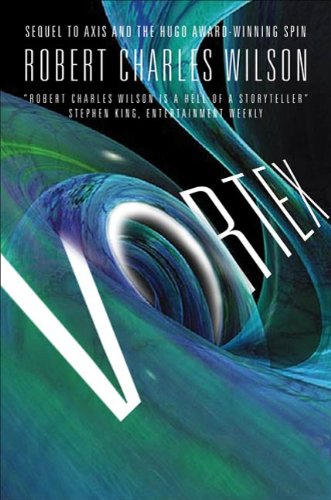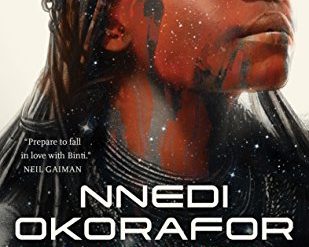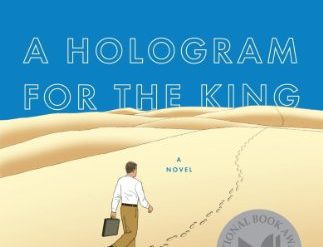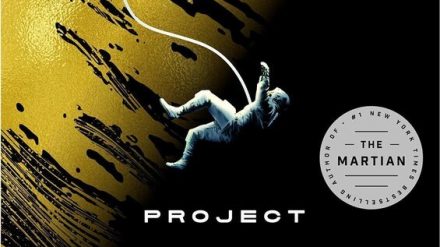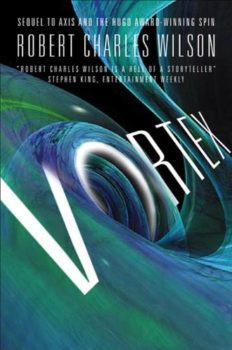
Estimated reading time: 5 minutes
The action in Vortex revolves around two couples: Sandra and Bose, and Turk and Allison. Both women are physicians, but their circumstances could hardly be different. They live on different planets separated by 10,000 years. Bose is a police officer on Earth in Sandra’s time. Allison lives 10,000 years in the future light-years away. But Turk has lived in both periods. Confusing enough? Robert Charles Wilson will explain, more or less. But it’s not certain you’ll be any less confused once you know.
Four billion years have elapsed
The world of the Spin Trilogy is unfathomable to us mere mortals of the twenty-first century because the Spin hasn’t happened yet. That’s the time when mysterious aliens called Hypotheticals cause the stars to disappear from the sky—and build a gigantic Arch that spans the Indian Ocean. The stars are no longer visible because the Hypotheticals have shrouded the planet in a barrier that isolates Earth from the much more rapid passage of time outside. There, four billion years elapse in the course of several decades on Earth.
Vortex (Spin Trilogy #3) by Robert Charles Wilson (2011) 334 pages ★★★☆☆
From Earth to Equatoria to Vox, through a string of Arches
In Spin, the first book in the trilogy, the story unfolds on Earth. Axis, the second book, is set on a New World often called Equatoria, for its largest continent. People from Earth have colonized Equatoria by sailing on ships through the Arch, which we would know better as a wormhole, that allows for instantaneous travel. Now, in Vortex, the trilogy’s third book, most of the action takes place on an archipelago of linked floating islands named Vox. The archipelago is, more properly, a ship, though one that is enormous beyond our present-day comprehension. Vox is in transit to Earth along what has become a string of Arches constructed by the Hypotheticals.
From one planet to another, 10,000 years later
Somehow, Turk, a character in the second book, has reappeared 10,000 years later in Vox. (“Turk Findley, born in the last years of the Spin. Variously, a day laborer, sailor, small-plane pilot.”) At the conclusion of Axis, he had been swept up in a monster desert storm on Equatoria. Now, he arrives in a desert on a different planet 100 centuries later. There, he is rescued by Allison and flown to Vox Core, where her society is based.
Meanwhile, 10,000 years earlier on Earth but somewhat later in the twenty-first century, Officer Bose has brought a confused and seemingly retarded young man to Sandra for admittance to a facility where his condition can be diagnosed.
As the The Spin Trilogy concludes, two minor characters from Axis become pivotal
It’s clear early on that the two couples’ stories are closely linked, and only partly because Turk figures as a central character in both of them. The connection becomes even clearer when Turk encounters Isaac Dvali, a young Martian man he had known on Equatoria. Isaac, as we will learn, is truly the central character in this drama although he doesn’t take center stage until late in the story. Do not be surprised when Isaac survives the heat death of the universe.
“Cortical democracies” vs. “limbic democracies”
In this far-future universe, human society is governed by democracies that function because every inhabitant of each polity is wirelessly linked to every other. Implants placed in the neocortex, the seat of rational thinking, enable this connection in the “cortical democracies.” In the “limbic democracies,” they’re located in the limbic system, which generates intuition and emotion. For thousands of years, these societies have been at war. Both systems are “ways of implementing consensus governance.” And the far-future world where we meet Turk again is much the worse for it. “Wars we fought here,” Allison explains to Turk. “The planet was radically depopulated and has never really recovered.” Yet it’s only a temporary home for the people of Vox. Their destination is Earth, where they hope to commune with the Hypotheticals, as their prophets have foreseen.
The author deserves high marks for imagination. However, the fanciful premise on which the first two books in the trilogy are based seems to get out of control in Vortex. At times it’s difficult to understand what’s going on.
About the author
Robert Charles Wilson has written sixteen novels and won numerous science fiction awards, including the Hugo for Best Novel for Spin. Stephen King has reportedly called Wilson “probably the finest science-fiction author now writing.” I enjoy the man’s work, but I don’t agree with Mr. King.
For related reading
Previously I reviewed the first two novels in the Spin Trilogy:
- Spin (A Big History of the future in this popular visionary science fiction novel)
- Axis (In this sci-fi novel, God is a networked intelligence scattered through the galaxy)
I’ve also reviewed Bios by Robert Charles Wilson (Struggling for life in a hostile alien environment).
For more good reading, check out:
- These novels won both Hugo and Nebula Awards
- The ultimate guide to the all-time best science fiction novels
- 10 top science fiction novels
- The top 10 dystopian novels
- Ten new science fiction authors worth reading now
And you can always find my most popular reviews, and the most recent ones, on the Home Page.

